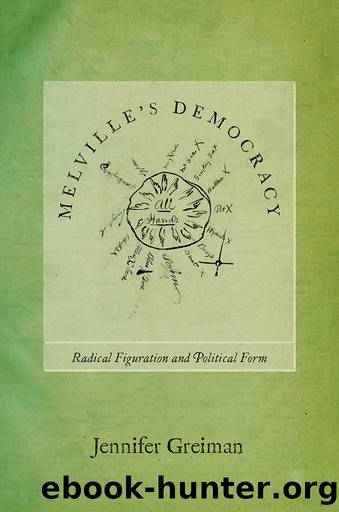Melville's Democracy by Jennifer Greiman;

Author:Jennifer Greiman;
Language: eng
Format: epub
Publisher: Stanford University Press
Published: 2022-06-15T00:00:00+00:00
But such a generalization too quickly elides a number of complications in this narrative of democracy and its defeat on board the Pequod. For one thing, while it would seem that Starbuckâs âdemocratic dignityâ cannot withstand the force of Ahabâs âirresistible dictatorshipâ (147), it is not with the force of âdictatorshipâ alone that Ahab redirects the mission of the ship, and for another, Ahabâs mission cannot be described simply in terms of a defeat or a usurpation of the Pequodâs âdemocraticâ crew. Although Ishmael suggests that Ahab embodies a power that would require no sanction from his crew, Ahabâs announcement produces just that, as everyone but Starbuck voices assent: âThe crew, man, the crew! Are they not one and all with Ahab, in this matter of the whale? . . . Stand up amid the general hurricane, thy one tost sapling cannot, Starbuck!â (164). If, as Dimock and others argue, this moment marks the defeat of democracy in the text, it is not simply the sovereign force of a dictator or despot that defeats it, but neither is it exactly âdemocracyâ that defeats âdemocratic dignity.â Instead, a particular mutation within âdemocracyâ is at workâjust as a mutation within whaling underlies Ahabâs determination of their mission. Instead of killing whales in general, the crew will now hunt one whale in particular, and as Starbuck realizes with a great deal of trepidation, this changes everything about both whaling and the whalers themselves.
Rather than a totalitarian power grab, Ahabâs desire for vengeance against a âdumb bruteâ is a powerfully equalizing gesture, one that solicits assent from the crew and pits human against whale on the same ontological field: âThere is ever a sort of fair play herein, jealousy presiding over all creationsâ (164).39 His singular decision on the exceptional purpose of the Pequodâs voyage may resemble the muscular view of sovereign power (the return to âthe ipseity of the oneâ), but Ahab acts from a position of immanence, not transcendence. If the crew is âone and all with Ahab in this matter of the whaleâ this is because, as Ahab himself describes it, he acts through them not over them: âMy one cogged circle fits into all their various wheels, and they revolveâ (167). Melville refuses us the comforts of a âdictatorshipâ usurping a âdemocracyâ in these pages because, from âKnights and Squiresâ to âThe Quarter-Deckâ and beyond, sovereignty and democracy, figured as centralization and equality, swirl around each other with increasing velocity and intensity. Indeed, it is chiefly through circular figures that Melville underscores the intimate connection between all of these terms as circles, spirals, and rotations abound in these chapters. If âthe centre and circumference of all democracyâ designates a circle where equality is sovereign and sovereignty equal, it also marks out the space of the âkingly commonsâ from which Ishmael singles out âa poor old whale-hunterâ and artfully endows him with all the âmajestical trappings and housingsâ of Emperors and Kings (148). Such circles first move centrifugally, raying out to
Download
This site does not store any files on its server. We only index and link to content provided by other sites. Please contact the content providers to delete copyright contents if any and email us, we'll remove relevant links or contents immediately.
Verus Israel: Study of the Relations Between Christians and Jews in the Roman Empire, AD 135-425 by Marcel Simon(552)
Infocracy by Byung-Chul Han(545)
Caesar Rules: The Emperor in the Changing Roman World (c. 50 BC â AD 565) by Olivier Hekster(531)
Europe, Strategy and Armed Forces by Sven Biscop Jo Coelmont(483)
Banned in the U.S.A. : A Reference Guide to Book Censorship in Schools and Public Libraries by Herbert N. Foerstel(449)
Reading Colonial Japan by Mason Michele;Lee Helen;(445)
Give Me Liberty, Seventh Edition by Foner Eric & DuVal Kathleen & McGirr Lisa(445)
The Roman World 44 BC-AD 180 by Martin Goodman(439)
DS001-THE MAN OF BRONZE by J.R.A(424)
The Dangerous Life and Ideas of Diogenes the Cynic by Jean-Manuel Roubineau(419)
The Oxford History of World War II by Richard Overy(415)
american english file 1 student book 3rd edition by Unknown(415)
Imperial Rome AD 193 - 284 by Ando Clifford(412)
Introducing Christian Ethics by Samuel Wells and Ben Quash with Rebekah Eklund(412)
Basic japanese A grammar and workbook by Unknown(392)
Literary Mathematics by Michael Gavin;(373)
Language Hacking Mandarin by Benny Lewis & Dr. Licheng Gu(353)
How to Reach the 9.0 in IELTS Academic Reading by IELTS Medical(334)
The Oxford History of the Renaissance by Campbell Gordon;(332)
